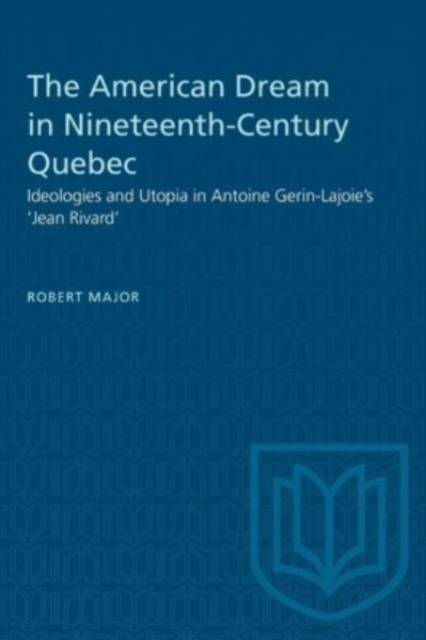
- Afhalen na 1 uur in een winkel met voorraad
- Gratis thuislevering in België vanaf € 30
- Ruim aanbod met 7 miljoen producten
- Afhalen na 1 uur in een winkel met voorraad
- Gratis thuislevering in België vanaf € 30
- Ruim aanbod met 7 miljoen producten
Zoeken
The American Dream in Nineteenth-Century Quebec
Ideologies and Utopia in Antoine Gerin-Lajoie's 'Jean Rivard'
Robert Major
€ 67,95
+ 135 punten
Omschrijving
Antonine Gerin-Lajoie's Jean Rivard (1862-4) is recognized as a landmark novel in Quebec literature. It has come to be regarded as a typical mid-nineteenth-century example of the conservative and reactionary nationalism and patriotism into which French Canadians withdrew after the crushing of the Patriotes in 1837 and 1838. In this brilliant and iconoclastic study, which is an adaptation and translation into English of his 'Jean Rivard' ou l'Art de reussir: Ideologies et utopie dans l'oeuvre d'Antoine Gerin-Lajoie, published in 1991. Robert Major challenges this view of the novel and of the political and intellectual millieu in which it was produced. He suggests that Quebec culture in the nineteenth century was far richer and more diverse than the prevailing view allows.
While Jean Rivard is a novel about settlement, the need to develop the virgin territories of Canada, Major contends that it also a success story based on the American model of Horatio Alger -- a novel which advocates economic liberalism and urbanization as well as rugged individualism. Through his analysis of Jean Rivard Major re-examines the attitudes to the United States common in the period and points to the way sin which the United States functioned in Quebec political imagery as an icon of democracy.
While Jean Rivard is a novel about settlement, the need to develop the virgin territories of Canada, Major contends that it also a success story based on the American model of Horatio Alger -- a novel which advocates economic liberalism and urbanization as well as rugged individualism. Through his analysis of Jean Rivard Major re-examines the attitudes to the United States common in the period and points to the way sin which the United States functioned in Quebec political imagery as an icon of democracy.
Specificaties
Betrokkenen
- Auteur(s):
- Uitgeverij:
Inhoud
- Aantal bladzijden:
- 272
- Taal:
- Engels
- Reeks:
Eigenschappen
- Productcode (EAN):
- 9781487577124
- Verschijningsdatum:
- 15/12/1996
- Uitvoering:
- Paperback
- Formaat:
- Trade paperback (VS)
- Afmetingen:
- 156 mm x 234 mm
- Gewicht:
- 376 g

Alleen bij Standaard Boekhandel
+ 135 punten op je klantenkaart van Standaard Boekhandel
Beoordelingen
We publiceren alleen reviews die voldoen aan de voorwaarden voor reviews. Bekijk onze voorwaarden voor reviews.







